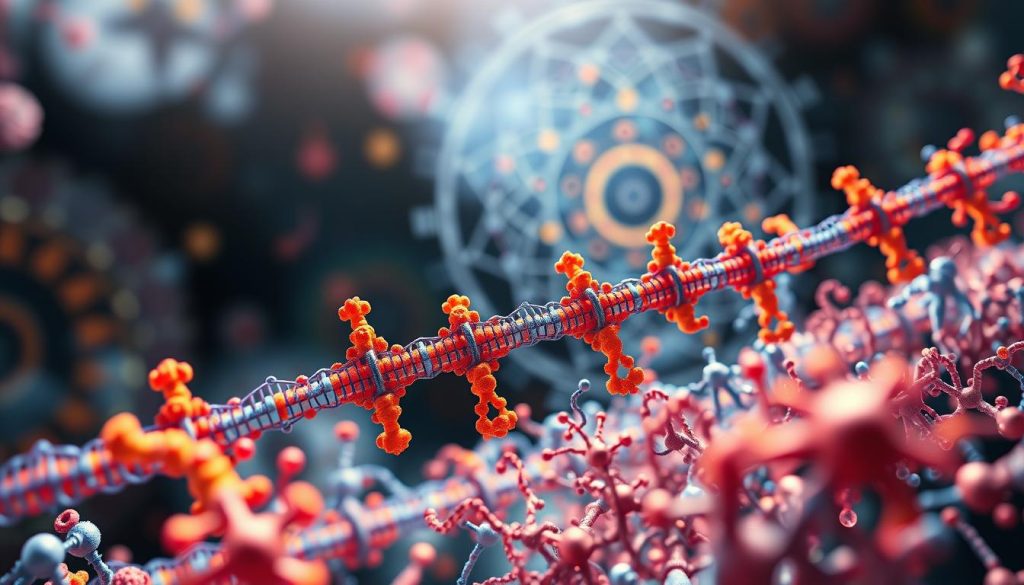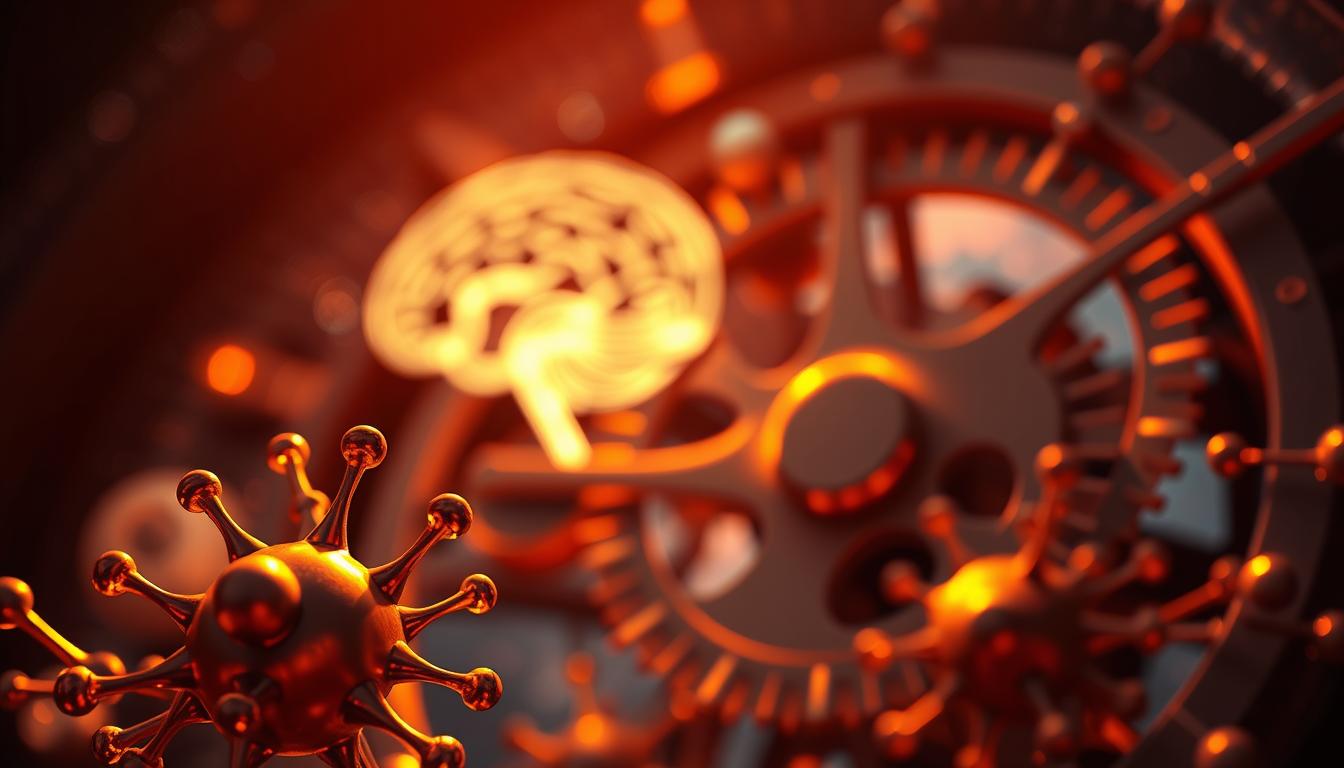Your body has an amazing internal clock that never stops. It controls when you feel sleepy and when you’re most alert. It also manages your body temperature throughout the day.
Every cell in your body follows a 24-hour cycle. This natural timing system has evolved over millions of years. Your molecular circadian rhythm acts like a master conductor, coordinating your body’s functions.
Ever feel more awake in the morning and tired at night? That’s your circadian clock at work. It affects your hormone levels, digestion, immune function, and mental sharpness.
When this timing gets disrupted, it can surprise you. Knowing how your body’s cycles work helps you make better health choices. It improves your daily routine.
What is Molecular Circadian Rhythm?
Inside every cell in your body, there’s a tiny clock that controls when genes turn on and off. This clock works all day, making sure your body functions at the right times. It’s the basis of how we experience day and night.
These cellular rhythms act like conductors in an orchestra, coordinating hormone release and DNA repair. Each cell has its own clock that syncs with your body’s main clock. This ensures your body works as one unit.

Definition and Overview
Molecular circadian rhythm is about the 24-hour cycles in gene expression and protein production. It involves feedback loops where genes produce proteins that then stop their own production. This creates a cycle that repeats every 24 hours.
Scientists call the key players “clock genes” and “clock proteins.” These molecules keep your internal clock accurate. When it works right, your body gets ready for daily changes ahead of time.
At its heart, the molecular circadian rhythm is your body’s schedule. It tells you when to be alert, hungry, or sleepy. It affects almost every process in your body.
Historical Background
The study of molecular circadian rhythms started with observations of plants and animals. In the 1700s, French scientist Jean-Jacques d’Ortous de Mairan found that mimosa plants kept their daily patterns even in constant darkness. This showed there was an internal timing mechanism.
The big leap came in the 20th century. Researchers like Seymour Benzer and Ronald Konopka found the first clock genes in fruit flies in the 1970s. Their work showed genetic changes could affect daily patterns.
The field really took off in the 1990s with the discovery of clock genes in mammals, including humans. Jeffrey Hall, Michael Rosbash, and Michael Young won the 2017 Nobel Prize for their work on circadian rhythms. Their research showed these clocks are common in all living things.
Importance in Biological Systems
Molecular circadian rhythms are key for health and survival. They coordinate processes like metabolism, immune function, and tissue repair. Without them, your body can’t keep the balance needed for health.
The biological clock affects hormone production. Cortisol peaks in the morning to wake you up, and melatonin increases at night for sleep. Growth hormone is released during deep sleep, helping with repair and growth.
These rhythms also control metabolism and digestion. Your body gets ready for meals by increasing digestive enzymes. Blood sugar, fat storage, and energy use all follow daily patterns controlled by these rhythms.
Most importantly, molecular circadian rhythms help your body prepare for daily challenges. This predictive ability leads to better energy use and stress management. When these systems work well, you sleep better, feel happier, and perform better physically.
Mechanisms of Molecular Circadian Rhythm
Every cell in our body has a built-in timekeeper. It controls our daily rhythms, like when we sleep and when our body temperature is highest. This system is made up of genes and proteins working together.
This system is incredibly consistent. It keeps its rhythm even without external cues. It’s a remarkable example of nature’s engineering skill.
Core Components of the Circadian Clock
The master clock is in a small part of our brain called the suprachiasmatic nucleus. It has about 20,000 specialized neurons. Each neuron works together to keep the timing signal consistent.
Every cell in our body has its own clock. These clocks are in our liver, heart, muscles, and skin. They get timing signals from the master clock but can also work on their own.

The master clock and peripheral clocks work together. The master clock is like a conductor, and peripheral clocks are like musicians. This ensures that different parts of our body stay in sync.
Gene Expression and Regulation
Circadian timing is based on genes that turn on and off every 24 hours. Important genes include CLOCK, BMAL1, PERIOD, and CRYPTOCHROME. These genes create rhythmic patterns.
These genes work through feedback loops. During the day, CLOCK and BMAL1 activate other genes. As these genes produce proteins, they eventually shut down their own production. This cycle takes about 24 hours to complete.
These clock genes control thousands of other genes. This affects hormone production and immune function. Environmental factors like light and activity can influence these cycles.
Role of Proteins in Circadian Rhythm
Proteins are the timekeepers in our circadian system. They accumulate and degrade in cycles that control cellular processes. Important proteins include CLOCK, BMAL1, PERIOD, and CRYPTOCHROME.
CLOCK and BMAL1 proteins activate genes during certain times. They bind to DNA and start the production of other proteins. This happens mainly at night and in the early morning.
PERIOD and CRYPTOCHROME proteins act as brakes. They accumulate during the day and shut down CLOCK and BMAL1. This creates the cycle.
The timing of protein degradation is crucial. Special enzymes break down proteins at specific times. This ensures our clocks stay accurate.
These protein cycles are the foundation for all circadian-regulated processes. They affect our alertness, metabolism, and immune function.
The Impact of Circadian Rhythms on Health
Your body has an internal clock that controls more than just sleep. It manages health processes all day long. When it works right, you’re awake during the day and sleepy at night. But, problems with this clock can lead to health issues.
Our modern lives often clash with our natural rhythms. Working late shifts, using screens too long, and eating at odd times can mess with our clock. Knowing how these factors affect our health helps us understand why some problems are hard to fix.
Sleep Patterns and Quality
Sleep is closely tied to our internal clock and health. This clock tells us when to sleep and wake up. It’s controlled by melatonin at night and cortisol in the morning.
Problems with our clock can make sleep hard. You might find it hard to fall asleep, wake up a lot at night, or not sleep deeply. People who work odd hours often struggle with this because their work schedule doesn’t match their natural rhythm.
When you go to bed and wake up at the same time every day, your clock stays strong. Getting enough sleep hours is important, but it’s not enough if you’re always changing your sleep schedule.

Metabolism and Weight Regulation
Your metabolism runs on a 24-hour cycle. It affects how you process food and store energy. Your body is more sensitive to insulin in the morning and less at night.
Studies show that when you eat affects your metabolism, not just how much you eat. Eating big meals later in the day can make you gain weight. This is because your body is used to eating during the day and processes food better then.
Working at night can mess with your metabolism, even if you eat and exercise the same. Night workers often have more obesity, diabetes, and metabolic syndrome. Their eating times don’t match their body’s natural rhythm, causing stress.
Mental Health and Mood Disorders
There’s a strong link between our internal clock and mental health. Problems with sleep can lead to mood disorders, and these disorders can mess with our clock. This makes treating both conditions harder.
Seasonal Affective Disorder shows how light affects mood through our clock. Less daylight in winter can make our rhythms shift and lead to depression. Light therapy helps reset these cycles.
Research in chronobiology shows many mental health issues involve clock problems. People with bipolar disorder often have irregular sleep patterns. Depression often includes waking up early and changes in sleep patterns.
Cortisol, a stress hormone, follows a daily pattern. It’s highest in the morning and lowest at night. When this pattern is disrupted, it can cause anxiety, mood swings, and stress. Keeping regular sleep times helps keep cortisol levels healthy and supports emotional balance.
Environmental Influences on Circadian Rhythms
The world around us sends signals that can either help or harm our natural rhythms. These signals, called zeitgebers, are key to keeping our internal clocks in sync with the outside world.
Knowing how your environment affects your rhythms gives you power. Simple changes in your daily life can greatly improve your sleep and health.
Light Exposure and Its Effects
Light is the most powerful signal for our circadian system. Natural sunlight during the day keeps our rhythms strong. Morning light is especially important, telling our brain it’s time to start the day.
Blue light from screens at night can mess with our natural rhythms. It makes our brain think it’s still daytime. Here are some tips to manage light:
- Get 15-30 minutes of natural sunlight within an hour of waking
- Use blue light filters on devices after sunset
- Dim indoor lights 2-3 hours before bedtime
- Keep your bedroom as dark as possible during sleep

The Role of Diet and Eating Patterns
Your eating schedule is a strong signal for your body’s clocks. Research shows that when you eat can affect your rhythms as much as what you eat.
Irregular eating can mess with your internal timing. Eating late at night or skipping breakfast sends confusing signals. Your digestive system works best with regular timing.
Here are ways to improve your eating patterns:
- Eat your largest meal earlier in the day
- Maintain consistent meal times daily
- Avoid heavy meals 3 hours before bedtime
- Consider a 12-hour eating window to support natural rhythms
Social Interactions and Their Impact
Social signals also play a big role in our circadian health. Work schedules, family routines, and social activities all impact our internal timing. Irregular schedules can disrupt our natural rhythms.
Your social life puts pressure on your biological clock. Staying up late on weekends can cause “social jet lag.” This misalignment affects your health.
Building supportive social routines helps keep your rhythms healthy. Regular family meals, consistent work hours, and planned social activities are positive signals that strengthen your natural rhythms.
Tips for Aligning Daily Life with Circadian Rhythms
Working with your molecular circadian rhythm can change your health and energy. Simple daily changes can align your biological clock with nature.
Creating a Steady Sleep Pattern
Go to bed and wake up at the same time every day. Your body likes routine. If your schedule changes, adjust it slowly by 15-30 minutes each day.
Stay away from screens an hour before bed. This helps your brain get ready for sleep.
Smart Light Management
Get bright light early in the morning. Open curtains or take a short walk outside. Work near windows during the day.
As night falls, dim the lights and use warm bulbs. Blue light glasses can help if you’re using devices at night.
Strategic Meal Timing
Eat your biggest meal when your metabolism is highest. Finish eating 2-3 hours before bed. Try a 12-hour eating window, like 7 AM to 7 PM.
This lets your digestive system rest and supports your rhythm.
Small changes in sleep, light, and eating can make a big difference. Start with one change and add more. Your body will appreciate it.

